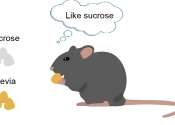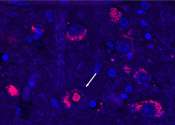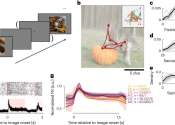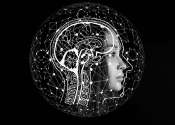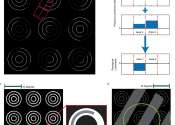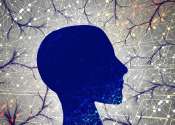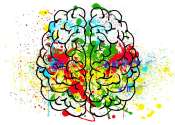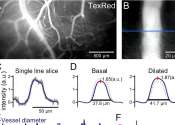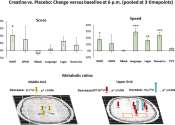Last update:
Neuroscience news
Neuroscience
Researchers find unexpected link between essential fats and insulin aggregation
Scientists within Texas A&M AgriLife Research have discovered a surprising connection between certain fatty acids and insulin when mixed in solution. Their study, published in ACS Chemical Neuroscience, showed the presence ...
May 3, 2024
0
68
Medical research
Birds overcome brain damage to sing again
Every year, more than 795,000 people experience a stroke, often resulting in brain damage that impairs their ability to speak, walk, or perform tasks. Fortunately, in many cases, these abilities can be regained through physical ...
May 3, 2024
0
32
Genetics, not lack of oxygen, causes cerebral palsy in quarter of cases: Study
The world's largest study of cerebral palsy (CP) genetics has discovered genetic defects are most likely responsible for more than a quarter of cases in Chinese children, rather than a lack of oxygen at birth as previously ...
May 3, 2024
1
35
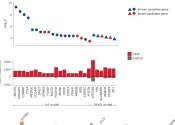
The key role of Galectin-3 in brain tumor development
A research group at the Department of Biochemistry and Molecular Biology of the University of Seville has made a significant advance by discovering the crucial role of the protein Galectin-3 in the progression of various ...
May 3, 2024
0
12
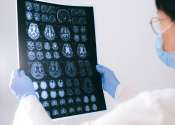
Exploring how brain chemistry influences formation of political opinions
Researchers are exploring a new theory on how the chemistry of the brain causes people to form political opinions. James Cook University neuroscientist Professor Zoltan Sarnyai was part of an international team exploring ...
May 3, 2024
0
15

How music affects the cognitive health of older adults
Listening to music benefits older adults' cognitive health, even if it's music they haven't heard before or don't enjoy very much, according to a study by Simon Fraser University and Health Research BC researchers.
May 3, 2024
0
1

Multicomponent intravenous lipid emulsion found to improve brain development in preterm infants
Preterm infants supported with a multicomponent intravenous lipid emulsion saw improved brain development compared to those given a single-fat source, a new study finds. The research will be presented at the Pediatric Academic ...
May 3, 2024
0
0

Small molecule shows early-stage promise for repairing myelin sheath damage
When treated with a novel protein function inhibitor called ESI1, mice that mimic the symptoms of multiple sclerosis (MS) and lab-prepared human brain cells both demonstrated the ability to regenerate vital myelin coatings ...
May 2, 2024
0
46
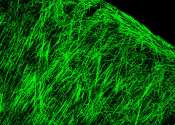
How the brain structure that produces norepinephrine also helps control visual attention
The locus coeruleus (LC) is a small region of the brainstem that produces norepinephrine, a chemical with powerful effects on arousal and wakefulness which plays an important role in the body's response to stress or panic. ...
May 2, 2024
0
14

Early genetic development of the brain mapped
In an article published in Nature, researchers from Karolinska Institutet present an atlas of the early development of the brain. The atlas can be used, among other things, to find out what went wrong in the development of ...
May 2, 2024
0
31

New findings activate a better understanding of Rett syndrome's causes
Rett syndrome is a rare neurodevelopmental disorder for which there is currently no cure or good therapy. It causes severe physical and cognitive symptoms, including many that overlap with autism spectrum disorder.
May 2, 2024
0
5

A promising new treatment strategy for deadly flu-related brain disorders
It might start simply, with a cough or sneeze, but in some cases, the flu virus can make its way to your brain, causing serious symptoms or even death through a disease known as influenza-associated encephalopathy (IAE).
May 2, 2024
0
6

Brain imaging study reveals connections critical to human consciousness
In a paper titled, "Multimodal MRI reveals brainstem connections that sustain wakefulness in human consciousness," published in Science Translational Medicine, a group of researchers at Massachusetts General Hospital and ...
May 1, 2024
1
137

Research on how dietary choline travels through the blood-brain barrier reveals pathway for treating brain disorders
A University of Queensland researcher has found molecular doorways that could be used to help deliver drugs into the brain to treat neurological disorders.
May 1, 2024
0
47

Researcher discusses mechanism behind a birth defect affecting brain size
Nonsense-mediated RNA decay, or NMD, is an evolutionarily conserved molecular mechanism in which potentially defective messenger RNAs, or mRNAs (genetic material that instructs the body on how to make proteins), are degraded. ...
May 1, 2024
0
38
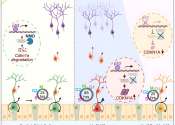
Scientists say sleep resets brain connections—but only for first few hours
During sleep, the brain weakens the new connections between neurons that had been forged while awake—but only during the first half of a night's sleep, according to a new study in fish by UCL scientists.
May 1, 2024
0
9

Preclinical study finds novel stem cell therapy boosts neural repair after cardiac arrest
Researchers at the University of Maryland School of Medicine (UMSOM) have identified an innovation in stem cell therapy to regenerate neural cells in the brain after cardiac arrest in an animal model. The study led by Xiaofeng ...
May 1, 2024
0
25

Scientists identify new brain circuit in mice that controls body's inflammatory reactions
The brain can direct the immune system to an unexpected degree, capable of detecting, ramping up and tamping down inflammation, shows a new study in mice from researchers at Columbia's Zuckerman Institute.
May 1, 2024
0
13
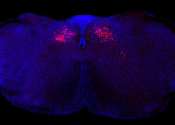
Study finds network of inflammatory molecules may act as biomarker for risk of future cerebrovascular disease
A simple blood test could allow doctors to determine whether a person may be at higher risk for stroke or cognitive decline during their lifetime, according to a new UCLA Health study.
May 1, 2024
0
36
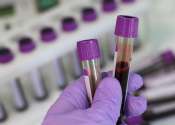
Emergency departments may frequently miss signs of epilepsy in children
A subtle type of seizure goes undetected two thirds of the time in pediatric emergency departments, a new study shows.
May 1, 2024
0
0




























